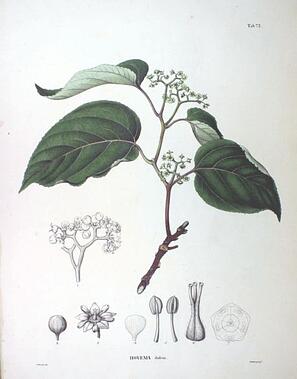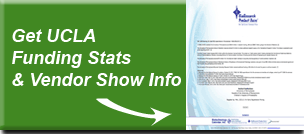Biomedical scientists, and especially pharmacologists, have probably always suspected that most of the good stuff is already out there, and the challenge is to find it, synthesize and refine it, and make sure it doesn't kill you in the process of curing you. Rain forest expeditions turn up thousands of novel plant compounds that might very well form the basis of a successful new drug therapy. Then there are the plants that cultures have been utilizing for centuries to treat various maladies but may have been dismissed as illusory "folk remedies." Now many of these traditional medicines (call them already-discovered compounds) are being reexamined and studied in the lab for their medical potential, sometimes with eye-opening results.
At the University of California Los Angeles' Geffen School of Medicine, researchers have just published the results of a study showing that dihydromyricetin (DHM), from an extract of Hovenia dulcis, or Chinese raisin tree, keeps lab rats from getting drunk and wanting alcohol. Drs. Jing Liang and Richard Olsen, from the department of molecular and medical pharmacology, report in a much-publicized paper in the Journal of Neuroscience that DMH appears to stop alcohol from accessing receptors in the brain for a neurotransmitter called gama aminobutyric acid (GABA). This, explains Liang, is why DHM kept the rats sober even when they had huge amounts of alcohol in their blood. It also seemed to cure hangovers if administered after intoxication.
[Hovenia dulcis drawing courtesy of the Encyclopedia of Life]
"This supports other data that GABA receptors are key in the actions of alcohol and that targeting this interaction is a viable approach to reducing alcohol intake," says another researcher in the field, David Nutt of Imperial College London, former head of the British government's advisory committee on drugs, of Liang and Olsen's findings.
Considering that alcohol use disorders (AUDs) are widespread, serious, and largely untreatable currently, the UCLA research with DHM on GABA receptors could represent a discovery as socially and medically profound as that of fermentation itself. Human trials are forthcoming.
The David Geffen School of Medicine at UCLA has more than 2,000 full-time faculty members and is one of an elite group of medical schools in the world. It is ranked 9th in the country in NIH research funding and 3rd in the US in research dollars from all sources.
Biotechnology Calendar Inc. brings life science researchers and laboratory supply vendors together to network, brainstorm and address laboratory problems and their solutions across the Unites States. One of our biggest and best-attended events is the Los Angeles Biotechnology Vendor Showcase™ event held twice-yearly on the UCLA campus. The next UCLA exposition (our 29th) is coming this April 5, followed by the Fall 2012 show on October 4. Find out more about exhibiting or attending by calling us, visiting our website, or clicking the button below:



